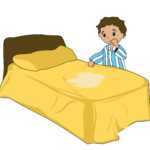
Do you remember any child whilst you were growing up who had problems keeping their bed dry? Bedwetting can be a traumatic experience for a child as well as the parents. Those days, unfortunately, tactics used by parents like shaming and threatening the child are counterproductive. The interesting thing is that bedwetting has a strong genetic component so it runs in the family. Most children who wet the bed are products of parents who had bedwetting problems as children too.
There is a 44% chance that the child will have bedwetting problems if one of the parents had that problem growing up. This probability jumps to 77% if both parents had bedwetting problems growing up.
Bedwetting at night for more than twice a week in a child over the age of 5 years is considered a problem.
Bedwetting is two times more common in boys and is also more common in children from large families and those from a low socioeconomic background.
Attending a boarding school increases the risk of a child having problems with bedwetting.
Parental education

As a parent, you cannot afford to be ignorant. You have to know that wetting the bed at night is not intentional and is outside the control of the child. Thankfully, as the child grows, the majority of cases will self-resolve.
Verbal and/or psychological abuse such as show and shame, insults, denial of benefits will only increase the stress level of the child and make the situation worse. Preserve your child’s self-esteem.
It is important that you carry your child along all the way. The child must buy in into whatever plan you have as a parent. If the child is not interested, there is no point pushing an agenda.
The family environment must be supportive. Parental reassurance with expectant management should be pursued.
 Treatment
Treatment
A good first approach is to use motivational therapy. Motivate the child and help him/her accept responsibility. Make sure he/she voids before bed and include the child in morning clean-up but not as a punishment. Record progress made and give rewards for longer periods of dryness.
Bladder Training is another good method. Ask the child to hold urine for successively longer periods when he/she gets the urge to urinate. Give rewards as with motivational therapy.
Fluid Management. Record all fluid intake for a day. Do not withhold fluids from your child. Every child needs to be well hydrated. Instead, your child’s fluid intake should be divided as follows: 40% of daily fluids in morning, 40% of daily fluids in afternoon, and 20% of daily fluids after five pm.
Enuresis Alarms are effective at helping a child stay dry through the night. The wetness sensor is placed under the bed sheets and would sound an alarm as soon as the child wets the bed. Let the child own the alarm, work with the alarm and report to you.
The alarm should be used continuously for 28 days after he/she has been dry. If the child regresses, just start all over again. He/she is likely to do better the next time around.
Pharmacotherapy. 
This is only considered after the child is 7 years old and co-morbidities have been ruled out by the doctor. Desmopressin is the drug of choice and it is given late in the evening. It comes both as a tablet and as a nasal spray.
The second drug of choice are the tricyclic antidepressants like imipramine. These are usually avoided because of their side effects.
(pics courtesy of Homeremedyhacks, dadhasrights and wedorecover)